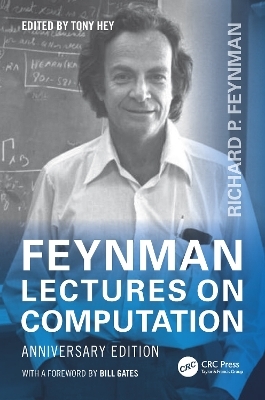
Feynman Lectures on Computation
CRC Press (Verlag)
978-0-367-85733-2 (ISBN)
The last lecture course that Nobel Prize winner Richard P. Feynman gave
to students at Caltech from 1983 to 1986 was not on physics but on computer
science. The first edition of the Feynman Lectures on Computation, published
in 1996, provided an overview of standard and not-so-standard topics in
computer science given in Feynman’s inimitable style. Although now
over 20 years old, most of the material is still relevant and interesting, and
Feynman’s unique philosophy of learning and discovery shines through.
For this new edition, Tony Hey has updated the lectures with an invited
chapter from Professor John Preskill on “Quantum Computing 40 Years
Later”. This contribution captures the progress made toward building a
quantum computer since Feynman’s original suggestions in 1981. The last
25 years have also seen the “Moore’s law” roadmap for the IT industry
coming to an end. To reflect this transition, John Shalf, Senior Scientist
at Lawrence Berkeley National Laboratory, has contributed a chapter
on “The Future of Computing beyond Moore’s Law”. The final update
for this edition is an attempt to capture Feynman’s interest in artificial
intelligence and artificial neural networks. Eric Mjolsness, now a Professor
of Computer Science at the University of California Irvine, was a Teaching
Assistant for Feynman’s original lecture course and his research interests
are now the application of artificial intelligence and machine learning
for multi-scale science. He has contributed a chapter called “Feynman
on Artificial Intelligence and Machine Learning” that captures the early
discussions with Feynman and also looks toward future developments.
This exciting and important work provides key reading for students and
scholars in the fields of computer science and computational physics.
The late Richard P. Feynman was Richard Chace Tolman Professor of Theoretical Physics at the California Institute of Technology. He was awarded the Nobel Prize in 1965 for his work on the development of quantum electrodynamics, and made many other fundamental contributions to physics. What is less well-known is his contribution to computer science with his ideas about quantum computing. He was one of the most famous and beloved figures of the twentieth century, both in physics and in the public arena. Tony Hey is Chief Data Scientist at the UK’s Rutherford Appleton Laboratory at Harwell. After an academic career including Dean of Engineering at the University of Southampton in the UK, he became Director of the UK’s pioneering eScience initiative. After 10 years as a Vice President in Microsoft Research in Redmond in the US, he returned to the UK and now leads a group applying Deep Learning neural networks to the analysis of experimental scientific data. He is also co-author of The Computing Universe: A Journey through a Revolution, a popular introduction to the development of computer science.
- Foreword by Bill Gates - Editor’s Preface - Feynman’s Preface - Author and Editor Biographies - Contributors 1. Introduction to Computers 2. Computer Organization 3. The Theory of Computation 4. Coding and Information Theory 5. Reversible Computation and the Thermodynamics of Computing 6. Quantum Mechanical Computers 7. Quantum Computing 40 Years Later 8. Physical Aspects of Computation 9: The Future of Computing Beyond Moore’s Law 10. Feynman on Artificial Intelligence and Machine Learning 11. Reminiscences 12. Afterword 13. Suggested Reading 13. Index
| Erscheinungsdatum | 16.06.2023 |
|---|---|
| Reihe/Serie | Frontiers in Physics |
| Zusatzinfo | 15 Tables, black and white; 222 Line drawings, black and white; 9 Halftones, black and white; 231 Illustrations, black and white |
| Verlagsort | London |
| Sprache | englisch |
| Maße | 152 x 229 mm |
| Gewicht | 680 g |
| Themenwelt | Mathematik / Informatik ► Informatik ► Theorie / Studium |
| Naturwissenschaften ► Biologie | |
| Naturwissenschaften ► Physik / Astronomie | |
| ISBN-10 | 0-367-85733-2 / 0367857332 |
| ISBN-13 | 978-0-367-85733-2 / 9780367857332 |
| Zustand | Neuware |
| Haben Sie eine Frage zum Produkt? |
aus dem Bereich


